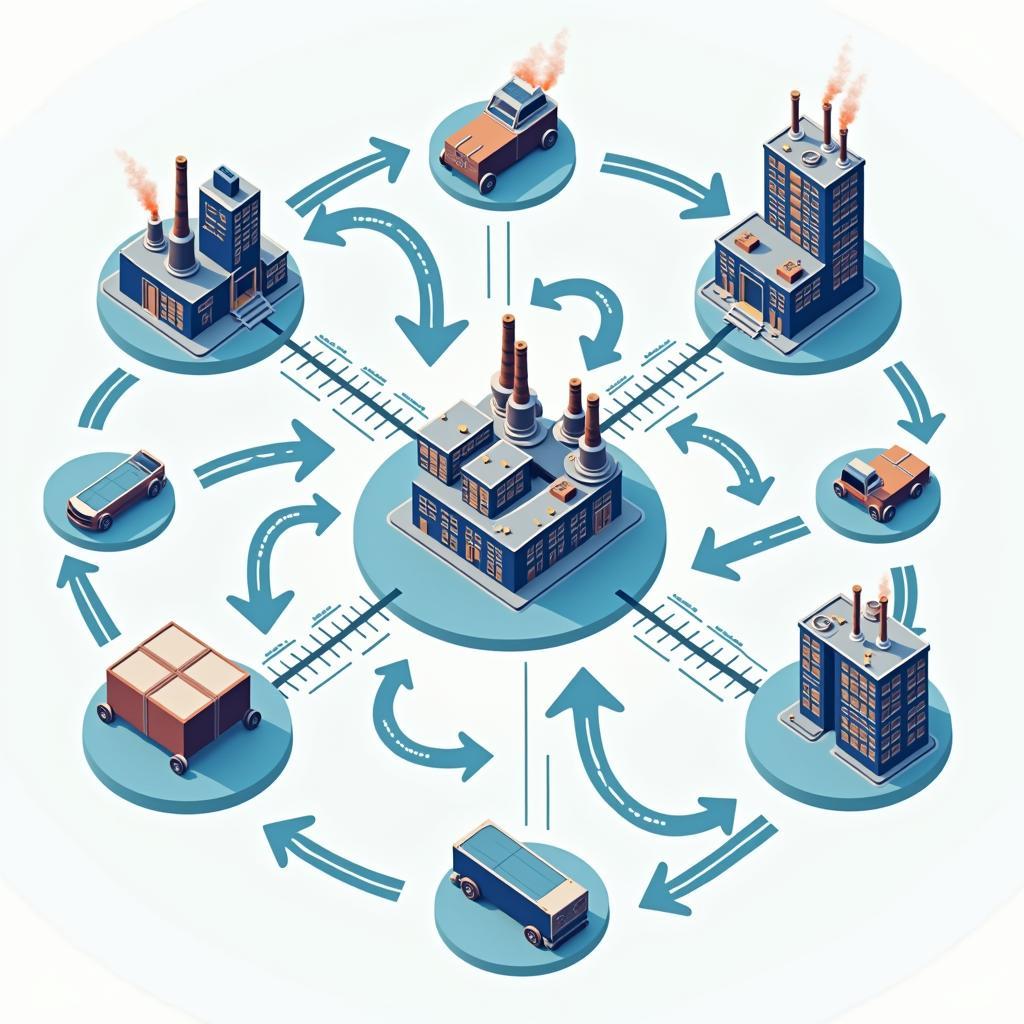Global supply chains and their effects on local economies have become an increasingly common topic in IELTS Writing Task 2, appearing in various forms over the past few years. Based on analysis of past exam questions and current economic trends, this theme is likely to continue featuring prominently in future tests.
The impact of globalization on local industries forms a crucial part of many IELTS Writing Task 2 questions. Let’s examine a recent example:
Some people believe that global supply chains have brought more benefits than drawbacks to local economies in developing countries. To what extent do you agree or disagree with this statement?
Analysis of Question
This question requires candidates to evaluate the positive and negative impacts of global supply chains on local economies, specifically in developing nations. The phrase “to what extent” indicates that you should clearly state your position and provide balanced arguments.
 Global supply chain networks connecting local manufacturers to international markets
Global supply chain networks connecting local manufacturers to international markets
Sample Essay 1 (Band 8-9)
The integration of local businesses into global supply chains has fundamentally transformed the economic landscape of developing nations. While I largely agree that this phenomenon has brought more advantages than disadvantages, it’s essential to examine both aspects critically.
Global supply chains have undeniably catalyzed economic growth in developing regions. The effects of outsourcing on local employment have been predominantly positive, creating millions of jobs and facilitating technology transfer. For instance, when multinational corporations establish manufacturing facilities in countries like Vietnam or Bangladesh, they typically introduce advanced production methods and provide extensive training to local workers. This knowledge transfer enhances the overall skill level of the local workforce and promotes industrial modernization.
Furthermore, participation in global supply networks has enabled local businesses to access international markets and attract foreign investment. Countries like India and China have witnessed remarkable economic transformation partly due to their integration into global supply chains, leading to improved infrastructure, increased exports, and higher living standards for their populations.
However, there are some notable drawbacks to consider. Local businesses often face intense pressure to meet international standards and price points, which can lead to compromised working conditions or environmental standards. Additionally, over-dependence on global supply chains can make local economies vulnerable to international market fluctuations and external shocks, as demonstrated during the recent global pandemic.
In conclusion, while acknowledging the challenges, I believe the benefits of global supply chains significantly outweigh their drawbacks for developing economies. The key lies in implementing proper regulations and safeguards while maximizing the advantages of global integration.
 Small local businesses adapting to global supply chain requirements
Small local businesses adapting to global supply chain requirements
Sample Essay 2 (Band 6-7)
In my opinion, global supply chains have brought more good things than bad things to local economies in developing countries. I will discuss both sides of this issue.
First, global supply chains create many jobs for local people. When big companies from other countries come to developing countries, they need many workers. This gives people jobs and steady income. Also, workers can learn new skills and modern technology. This helps them improve their work abilities.
How foreign direct investment boosts local economies can be seen in many countries. For example, many factories in my country started working with foreign companies. This helped them make better products and sell them to other countries. Local businesses also grew because they could supply things to these big companies.
However, there are some problems too. Sometimes local companies cannot compete with big foreign companies. Also, if global companies leave, many people might lose their jobs. Working conditions in some factories are not always good, and some companies don’t care about pollution.
In conclusion, I think global supply chains help developing countries more than they hurt them. But governments should make good rules to protect workers and the environment.
Key Vocabulary
- supply chain (n) /səˈplaɪ tʃeɪn/ – system of organizations involved in moving products from supplier to customer
- integration (n) /ˌɪntɪˈɡreɪʃn/ – the process of combining things into one
- catalyze (v) /ˈkætəlaɪz/ – to cause or accelerate change
- vulnerability (n) /ˌvʌlnərəˈbɪləti/ – susceptibility to harm
- infrastructure (n) /ˈɪnfrəstrʌktʃər/ – basic physical systems of a country
- fluctuation (n) /ˌflʌktʃuˈeɪʃn/ – irregular changes in level or amount
- modernization (n) /ˌmɒdənaɪˈzeɪʃn/ – the process of updating something
Tips for Similar Topics
Future IELTS candidates should prepare for related topics such as:
- Economic globalization effects
- International trade impacts
- Foreign investment in developing countries
- Local business development
- Environmental impacts of global trade
Feel free to practice by writing your own essay on this topic and sharing it in the comments section below. This will help you improve your writing skills and receive feedback from others.


